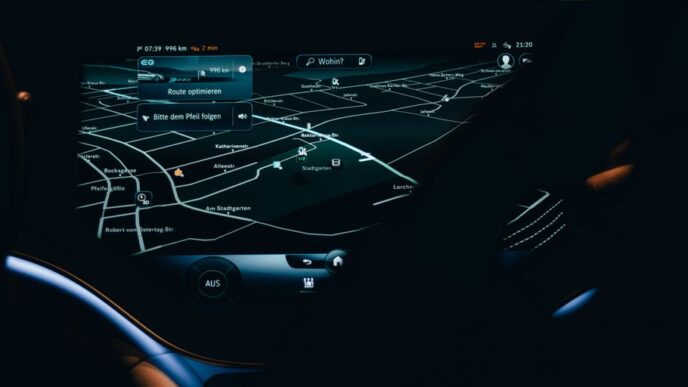Generative AI is making waves as we head into 2025. It’s not just a buzzword anymore; it’s changing how we work, play, and live. From business to science, AI is reshaping everything. But what does that mean for us? Let’s dive into the latest generative AI news and see what’s coming our way.
Key Takeaways
- Generative AI is becoming central to applications, shifting from supplementary to essential roles.
- Ethical AI and data privacy remain major challenges as AI adoption grows.
- AI is driving innovation in business and science, leading to new breakthroughs and efficiencies.
Generative AI Trends Shaping 2025
AI-First Applications Revolution
In 2025, we’re seeing a big shift from apps that just have a bit of AI sprinkled in, to ones where AI is the main event. This change is making AI a core part of how apps are designed. Before, AI was like a helpful assistant, maybe a chatbot here or a smart suggestion there. Now, it’s part of the main team, working alongside other tools in the app. Developers are starting to build apps with AI right from the start, using large language models to handle smart tasks. This isn’t just about making things easier, it’s about changing how we think about apps altogether. For example, coding tools are now integrating AI deeply into their systems, moving beyond simple plugins to fully AI-driven environments.
Rise of Service as Software
The idea of "Service as Software" is taking off. Instead of just offering software, companies are packaging up services that can be delivered through software platforms. This means businesses can provide more tailored experiences without having to build everything from scratch. It’s like having a ready-made toolkit that you can adjust to fit your needs. This trend is making it easier for companies to roll out new services quickly, adapting to what customers want almost in real-time. It’s a shift that’s making the tech world more flexible and responsive.
Enterprise Agent Integration
AI agents are becoming a big part of the workplace. Think of them as digital coworkers, handling tasks that used to take up a lot of human time. They’re not just about automating repetitive work; they’re also about providing insights and helping with decision-making. Businesses are starting to integrate these agents into their workflows, making them part of the team. This integration is helping companies run more smoothly and efficiently. It’s like having an extra set of hands—or brains—that can help keep everything on track. As these agents get smarter, they’re becoming indispensable tools in the corporate world.
Ethical Considerations in Generative AI

Transparency and Trust
In 2025, the world of AI technology advances continues to grow, and so do the concerns about transparency and trust. Businesses are realizing that to win over customers, they need to be open about how AI systems work and make decisions. People want to know what’s happening behind the scenes, especially when it comes to their data. Companies are now investing in making AI more understandable, aiming to build trust in a time where misinformation is everywhere. The challenge is not just about explaining AI but doing so in a way that makes sense to everyday users.
Data Privacy Challenges
Data privacy is a hot topic, and it’s not going away anytime soon. As AI systems get more sophisticated, they need more data to function effectively. But with this comes the risk of data misuse. In 2025, businesses are under pressure to protect user data while still harnessing it for AI development. It’s a delicate balance. Companies must ensure that their AI systems are not only effective but also respect user privacy. This means implementing strong data protection measures and being transparent about data usage. Users are becoming more aware and demanding about how their information is handled.
Regulatory Landscape
The regulatory landscape for AI is still a bit of a wild west. While there are some rules in place, they often lag behind the rapid pace of AI development. In 2025, it’s expected that there will be more discussions and possibly new regulations aimed at controlling AI’s impact on society. However, the challenge is creating rules that are flexible enough to accommodate future advancements without stifling innovation. Businesses are encouraged to participate in these discussions to help shape fair and practical regulations. The goal is to find a balance between fostering innovation and ensuring the safety and rights of individuals.
Generative AI in Business and Innovation

AI-Driven Operational Efficiency
In 2025, businesses are all about squeezing more out of less, and generative AI is at the heart of it. Companies are using AI to streamline processes like never before. Imagine AI agents taking over routine but complex tasks, like managing supply chains or automating customer support. This isn’t just about cutting costs; it’s about doing things faster and with fewer mistakes. AI isn’t just a tool; it’s a partner helping businesses make smarter decisions.
- AI agents handle routine operations, reducing human error.
- Automated systems improve supply chain efficiency.
- Customer support is more responsive and accurate.
Personalized User Experiences
Generative AI is changing how companies interact with customers. By 2025, AI systems can tailor experiences to individual preferences, making every interaction feel unique. Think of AI as a digital concierge that knows your tastes and preferences, from recommending products to customizing services. This level of personalization isn’t just nice to have; it’s becoming a must-have for businesses looking to keep customers engaged.
- AI-driven recommendations cater to individual tastes.
- Customized services enhance customer satisfaction.
- Businesses can predict customer needs before they arise.
AI Agents in Enterprise Workflows
The role of AI agents in enterprise workflows is expanding. Instead of just providing information, these agents are now executing tasks within business applications. This shift is significant because it allows businesses to integrate AI directly into their operations, making workflows more efficient. For instance, in financial services, AI agents can execute trades based on real-time data, offering more precise and timely responses than traditional methods. This integration is not just about efficiency; it’s about staying competitive in a fast-paced market.
- AI agents execute tasks directly within applications.
- Real-time data integration leads to better decision-making.
- Businesses gain a competitive edge by leveraging AI capabilities.
Scientific Breakthroughs Powered by Generative AI
Advancements in AI-Generated Content
In 2025, AI-generated content is not just a novelty—it’s a game-changer. We’ve moved beyond simple text and image generation to more complex creations like videos and music compositions. Imagine AI crafting a full-length feature film or composing a symphony. This year, expect to see more AI-produced media in your daily life. AI’s ability to generate high-quality content quickly and efficiently is reshaping the entertainment industry and beyond.
- AI in Film and Music: AI tools are now capable of creating entire movies and albums, opening up new possibilities for filmmakers and musicians.
- Interactive Storytelling: AI-generated narratives can adapt in real-time based on audience interaction, making each experience unique.
- Educational Content: AI is revolutionizing educational materials by generating personalized learning modules for students.
Open-Weight Models for Practical Applications
Open-weight models are becoming viable for a wide range of uses. These models are designed to be adaptable, allowing them to be fine-tuned for specific tasks without needing enormous resources. This is making cutting-edge AI more accessible across different sectors.
- Customization and Flexibility: Open-weight models can be tailored to meet the needs of various industries, from healthcare to finance.
- Resource Efficiency: These models require less computational power, making them more sustainable and cost-effective.
- Wider Adoption: With reduced barriers to entry, more companies are integrating AI into their operations, leading to broader innovation.
AI’s Role in Research and Innovation
AI is driving new discoveries across scientific fields. From drug discovery to climate modeling, its ability to analyze vast datasets quickly is accelerating research timelines.
- Healthcare Breakthroughs: AI is instrumental in developing new treatments by analyzing medical data and predicting outcomes.
- Environmental Science: AI models help in understanding climate patterns and predicting ecological changes.
- Technological Innovation: AI is at the forefront of developing new technologies, from quantum computing advancements to robotics.
Generative AI is not just a tool; it’s becoming a partner in scientific exploration, helping us push the boundaries of what’s possible. As AI continues to evolve, its impact on research and innovation will only grow, opening up new avenues for discovery.
Generative AI is changing the game in science! From discovering new medicines to solving complex problems, this technology is making amazing things happen. If you want to learn more about how these breakthroughs are shaping our future, visit our website for the latest updates and insights. Don’t miss out!
Wrapping Up: GenAI’s Path Forward
So, here we are, standing at the edge of 2025, and generative AI is more than just a buzzword—it’s becoming a staple in our tech toolkit. It’s like when smartphones first came out; everyone was skeptical, but now we can’t live without them. This year, we’re seeing AI not just as a fancy add-on but as a core part of how businesses operate. It’s not all smooth sailing, though. Companies are still figuring out how to make AI work for them without breaking the bank or running into ethical issues. But hey, that’s part of the journey, right? As we move forward, it’s clear that AI will keep pushing boundaries, making us rethink what’s possible. So, buckle up, because the ride is just getting started.














